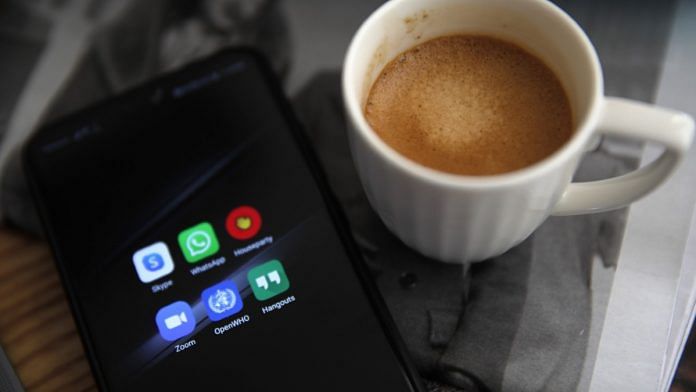As the world spent the past month in lockdown trying to flatten the coronavirus curve, it wasn’t tech giants like Google, Facebook and Microsoft that rode the wave. In fact, they were behind the curve, playing catch up with underdog apps like Zoom and Houseparty, which are leading the digital trend both on Android and iOS platforms despite major privacy concerns.
And the big rivals have noticed. For example, a super awkward incident took place on Monday when a Google executive’s son praised Zoom on a video call with other Google executives using Google Meet. They were coincidentally discussing Zoom’s popularity. Earlier, Google had barred employees from using Zoom citing “security vulnerabilities”.
With the rise of online courses, college students have started to joke about graduating from “Zoom University”. Meanwhile, “viral” and “overnight sensation” are just some of the ways that media reports across the world have used to describe the two apps.
Also read: Facebook targets Zoom with new group video chat feature
From dormant apps to tech underdogs
As global app consumption soars in 2020, app intelligence firm App Annie singled out Zoom Cloud Meetings and Houseparty as “breakout apps”. Except, they are not new entrants.
Zoom, with its 300 million active users — 100 million of which were raked in March alone — has successfully repurposed itself to fit the current quarantine needs since its 2011 launch. Among iPhone users, Zoom is the top-ranked business app in terms of daily downloads in 141 markets after being in just one market in the last quarter of 2019.
Houseparty was fairly dormant too. It was launched in 2016, had an impressive 10-month run with about a million users, but fell off the radar in 2018 after struggling to compete with rising platforms like TikTok and Instagram Stories. Fast forward to 15 March and Houseparty’s global downloads have increased 735 times from a week before.
Also read: Apple, Google to boost privacy protections for Covid-19 contact-tracing tool
Privacy concerns haven’t deterred popularity
The two apps continue to hover at the top of play stores despite serious privacy concerns. Zoom users have complained of unwanted guests hacking into video calls and posting racist or pornographic content. The app has also been criticised for sharing data with third parties without alerting users. Houseparty, on the other hand, has loopholes in its privacy policy that suggest it owns what you say inside the app and can share the data with its business partners.
Interestingly, privacy concerns haven’t deterred the popularity of underdog apps allowing them get away with the one thing big rivals are skewered for — data breach.
That’s because the demand for video chatting is the need of the hour — not a whim. The enormity of the coronavirus crisis, the desperation to connect in a socially distant world and the urgency of repairing office communication has allowed data infringement to become a blind spot. And Zoom and Houseparty, virtually unknown apps, were already in place to cater to this. Established firms weren’t quick enough.
It seems these apps are complementary because together they successfully cover all bases of personal and professional communication. As Houseparty CEO Sima Sistani sums it up — “Zoom by day, Houseparty by night”.
Also read: Through Covid, tech giants Google, Facebook, IBM now want to win back public trust
Big rivals with copycat features
Google and Facebook have acknowledged how video calling has become a legitimate form of social interaction. So they are tweaking their products to get into the game too.
Google Meet is reportedly seeing two million new users per day. It has added new features like a grid view layout (taken after Zoom’s) and noise-cancelling. It has also upped its accommodation of users on a single call from 50 to 100, closer to Zoom’s capacity. That’s still lower than Skype for Business, which supports up to 250 people and far behind Zoom’s “large meeting” add on that can accommodate 500 users.
Facebook’s upcoming ‘Messenger Rooms’ is clearly modelled on Houseparty. It allows you to “drop in and out of group video chats” while the “room” is open, just like Houseparty, which encourages spontaneous video chats.
This reeks of digital appropriation and we’ve seen it with Google Stamp copying Snapchat’s Discover and even Instagram Stories being modelled after Snapchat.
But reports that Houseparty illegally shared user data to none other than Facebook may make us wonder – are these underdogs or pawns?
Views are personal.



